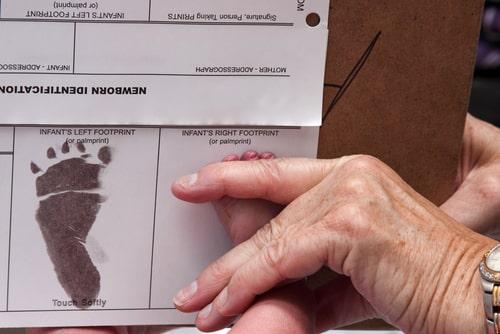Recent Blog Posts
Can a Father Refuse to Sign the Birth Certificate to Get Out of Child Support?
 In Illinois, both parents have a legal responsibility to provide financial support to a child. The parent with the greater amount of parenting time, or time spent with the child, is the parent who receives child support. The parent with less parenting time is responsible for making child support payments. Child support payors or "obligors" may be men or women. However, statistics show that about 85 percent of the people who pay child support are men.
In Illinois, both parents have a legal responsibility to provide financial support to a child. The parent with the greater amount of parenting time, or time spent with the child, is the parent who receives child support. The parent with less parenting time is responsible for making child support payments. Child support payors or "obligors" may be men or women. However, statistics show that about 85 percent of the people who pay child support are men.
Many people have questions about how and when a father is required to pay child support. For example, does a father have to pay child support if he never sees his child? Can a father surrender his parental rights? Can a father avoid paying child support by refusing to sign the birth certificate?
Parentage and Paternity in Illinois
In order to understand how child support works, it is important to first understand the concept of "parentage." Parentage is defined as the legal relationship between a child and his or her parents. Once parentage is established, parents have certain rights and responsibilities towards their child. Parentage involving fathers is called paternity.
Can I Get Divorced Even if I Am Pregnant?
 Unfortunately, life is unpredictable and rarely works out according to plan. If you are pregnant and considering divorce, you probably never expected to be in this position. You may be unsure of whether divorce is the right option or even possible in this situation.
Unfortunately, life is unpredictable and rarely works out according to plan. If you are pregnant and considering divorce, you probably never expected to be in this position. You may be unsure of whether divorce is the right option or even possible in this situation.
There is no one-size-fits-all answer to this question, as every pregnancy and divorce is unique. However, it is generally possible to get divorced while pregnant in Illinois. Whether or not it is the best option for you, however, depends on your individual circumstances.
Divorce Requirements in Illinois
There is no law preventing a spouse from getting divorced while pregnant. If you or your spouse is currently expecting, you will need to meet the same divorce requirements as any other couple. In Illinois, there is only one "ground" or legal justification for divorce: irreconcilable differences. If both spouses agree that there are irreconcilable differences and the marriage is unsalvagable, there is no mandatory waiting period before they can divorce. If one of the spouses disagrees that there are irreconcilable differences, the spouses can live separately for six months to meet the "irreconcilable differences" standard and proceed with the divorce. Furthermore, at least one spouse must have lived in Illinois for at least 90 days for the couple to qualify for a divorce.
Should I Work With a Divorce Coach During My Kane County Divorce Case?
 The term "divorce coach" is one that few are familiar with. The word "coach" is usually used in connection with sports teams or mentorship. You will not find a divorce coach wearing a whistle or explaining football plays. However, divorce coaches do fulfill a similar role as sports coaches. A divorce coach helps a divorcing spouse navigate their divorce from start to finish, providing the emotional and practical support the spouse needs during this difficult time.
The term "divorce coach" is one that few are familiar with. The word "coach" is usually used in connection with sports teams or mentorship. You will not find a divorce coach wearing a whistle or explaining football plays. However, divorce coaches do fulfill a similar role as sports coaches. A divorce coach helps a divorcing spouse navigate their divorce from start to finish, providing the emotional and practical support the spouse needs during this difficult time.
What Does a Divorce Coach Do?
Divorce is one of the most stressful experiences a person can go through. A divorce coach can do many things, but their main goal is to help a divorcing spouse cope with the emotional aspects of divorce. A divorce coach:
-
Helps the spouse identify and process their feelings
-
Provides guidance on how to deal with difficult emotions
-
Encourages the spouse to manage their stress levels
Update: More States Moving Toward Equal-Time Custody Arrangements
 Originally published: May 23, 2014 ---- Updated: September 12, 2022
Originally published: May 23, 2014 ---- Updated: September 12, 2022
The way Illinois describes child custody and visitation has changed in recent years. A parent's power to make major decisions about his or her child's upbringing is called "parental responsibilities." The time a parent spends caring for his or her child is "parenting time." Illinois courts encourage parents to work out the allocation of parental responsibilities and parenting time in a written agreement, but if the parents cannot agree, the court will make a decision.
If the parents have a "shared parenting" arrangement, each parent has the child at least 40 percent of the time. Child support calculations reflect the relatively equal amount of parenting time in shared parenting arrangements.
Fathers’ rights advocates across the country are challenging the presumption that women make better parents. These men accuse courts of affording women preferential treatment in child custody battles and argue that "joint" custody is a joke. But family law experts counter that the so-called maternal presumption is no longer the ubiquitous standard-bearer that it was formerly.
Update: Understanding Child Custody
 Originally published: April 29, 2015 ---- Updated: September 2, 2022
Originally published: April 29, 2015 ---- Updated: September 2, 2022
UPDATE: Parents who get divorced or break up often face many complex legal issues related to child custody. To make the situation even more complicated, child custody laws change frequently. In 2022, Illinois no longer describes child custody in terms of physical and legal custody or visitation.
The way divorced and never-married parents care for their children is broken down into two categories: "Parenting time" is the time each parent spends with the child. "Parental responsibilities" refers to the responsibility for making major decisions about the child's welfare, including education, medical care, and religious upbringing.
Some parents allocate all of the parental responsibilities to one parent. In other families, the parents share some or all of the responsibilities. Parenting time and parental responsibility arrangements are detailed in a parenting plan, which is submitted to the court for approval. The parent with the majority of the parenting time, meaning he or she spends the most amount of time directly caring for the child, is the recipient of child support. The parent with less parenting time pays child support.
Valuing a Small Business During a Kane County Divorce
 As any small business owner can attest to, running your own company is not an easy task. This is especially true presently. Between inflation, labor shortages, and the lingering effects of the Covid-19 pandemic, many business owners are struggling to keep their businesses afloat.
As any small business owner can attest to, running your own company is not an easy task. This is especially true presently. Between inflation, labor shortages, and the lingering effects of the Covid-19 pandemic, many business owners are struggling to keep their businesses afloat.
Getting divorced while simultaneously running a small business is even more complicated. Business owners must determine whether their business is partially or fully marital property and address the business during asset division. To do this, they will first need to determine the value of the company. Fortunately, business owners facing divorce do not have to handle all of these complex issues on their own. A divorce lawyer skilled in business valuation and division can provide direction and personalized assistance throughout the divorce process.
Valuing a Small Business During a Divorce
Businesses can be tricky to value, but there are a few methods that divorcing business owners can use to obtain an accurate valuation. One common method is the income approach. This approach values a business based on its future economic benefits. Businesses with higher incomes and profitability are typically valued at a higher amount than businesses with lower incomes.
5 Signs of Financial Deception During Divorce
 In Illinois, both spouses have a legal right to an equitable share of marital property. Some couples are able to negotiate the division of marital assets and debts without the court's involvement. Others take the case to trial and let the court decide an equitable division of assets.
In Illinois, both spouses have a legal right to an equitable share of marital property. Some couples are able to negotiate the division of marital assets and debts without the court's involvement. Others take the case to trial and let the court decide an equitable division of assets.
Before spouses can divide property, they must take a full account of what they own and what they owe. Unfortunately, some divorcing spouses try to deceive their spouse and the court about the true value of their assets. Here are five signs that your spouse may be hiding assets or lying about finances during your divorce.
Red Flags to Look for During Your Divorce
The law requires spouses to provide a complete accounting of assets and income during a divorce. Failure to disclose assets or lying on a financial affidavit during divorce is unlawful and can greatly impact the divorce outcome.
Signs that a spouse plans to manipulate the divorce in his or her favor through financial deception include:
Addressing Fine Art in Your High-Asset Kane County Divorce
 For art collectors and enthusiasts, paintings, photographs, sculptures, and other artworks may be some of the most valuable assets they own. Fine art has not only substantial financial value, it often has great personal significance. Both spouses may insist on keeping certain pieces which leads to contentious property division disputes. Furthermore, determining the value of a piece of art is not easy, and professional appraisers are often needed to value art assets during divorce. Unfortunately, some spouses may even use art as a vehicle for financial deception during a divorce. All of the factors can complicate the divorce process significantly.
For art collectors and enthusiasts, paintings, photographs, sculptures, and other artworks may be some of the most valuable assets they own. Fine art has not only substantial financial value, it often has great personal significance. Both spouses may insist on keeping certain pieces which leads to contentious property division disputes. Furthermore, determining the value of a piece of art is not easy, and professional appraisers are often needed to value art assets during divorce. Unfortunately, some spouses may even use art as a vehicle for financial deception during a divorce. All of the factors can complicate the divorce process significantly.
Determining Ownership of Fine Art
Usually, an asset that a spouse acquires during the divorce is a marital asset. Property that a spouse owned prior to the marriage is that spouse’s property alone. Property that a spouse received in an inheritance or gift is also classified as non-marital property. Unfortunately, classifying property is rarely this cut and dry. Countless factors can complicate the process of determining what property is included in the marital estate, including the commingling of assets.
How Should I Tell My Spouse I Want a Divorce?
 No one reaches the decision to divorce easily. Ending a marriage is one of the most emotionally burdensome experiences someone can go through. However, divorce is sometimes needed so that both spouses can end an unhappy marriage and move on to a better future.
No one reaches the decision to divorce easily. Ending a marriage is one of the most emotionally burdensome experiences someone can go through. However, divorce is sometimes needed so that both spouses can end an unhappy marriage and move on to a better future.
If you have decided that you want a divorce but you have not yet told your spouse about your decision, you may understandably be dreading the conversation. Many people who seek a divorce still care about their spouse’s wellbeing and recognize how devastating the news may be to him or her. As you prepare to move forward with your divorce, keep the following tips in mind.
Recognize the Advantages and Disadvantages of Telling Your Spouse in Person
Some individuals only learn that their spouse is divorcing them when they are served with the divorce petition and summons. If you and your spouse are still on good terms, you may find this approach unnecessarily aggressive. There are pros and cons to telling your spouse you want a divorce before filing a petition through the court. On one hand, telling your spouse in person may help you reduce hostility and promote cooperation through the divorce process. On the other hand, if you have not yet consulted a lawyer or filed the divorce petition, this could give your spouse the chance to hide assets or take other adverse actions against you.
Handling Custody Disagreements in Your Kane County Divorce
 Parents who get divorced have seemingly countless matters to figure out. Child custody, child support, and other child-related legal issues can be complex – legally and emotionally. If you are getting divorced and you and your spouse disagree on the terms of child custody, you may understandably be feeling overwhelmed. It can be hard to know where to even begin. This blog will discuss Illinois laws regarding child custody disputes and what to do if you need help with custody concerns during your divorce.
Parents who get divorced have seemingly countless matters to figure out. Child custody, child support, and other child-related legal issues can be complex – legally and emotionally. If you are getting divorced and you and your spouse disagree on the terms of child custody, you may understandably be feeling overwhelmed. It can be hard to know where to even begin. This blog will discuss Illinois laws regarding child custody disputes and what to do if you need help with custody concerns during your divorce.
Essentials of an Illinois Parenting Plan
The parenting plan or parenting agreement forms the foundation of any child custody arrangement. The main elements contained in the parenting plan include:
Allocation of parental responsibilities – Parents will need to determine how major decisions about their child’s life will be made. Parents may decide to make decisions about their child’s education, healthcare, religion, and other significant issues jointly or each parent may be designated specific decision-making authority. Alternatively, one parent may be given sole decision-making authority.











